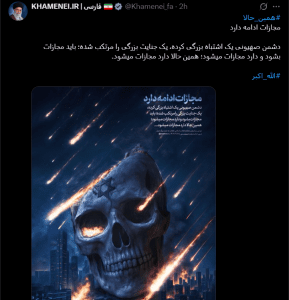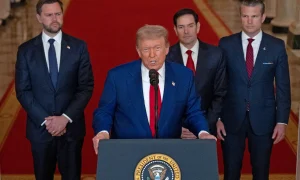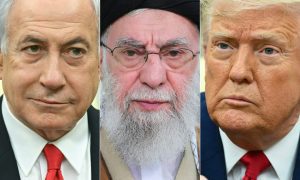New Delhi – In a surprising diplomatic maneuver, Iranian Supreme Leader Ayatollah Ali Khamenei’s response regarding the recent American military operations has drawn international attention for what it notably omits rather than what it addresses. Khamenei on US attack statements have conspicuously avoided any direct reference to Operation Midnight Hammer, the devastating American strikes on Iranian nuclear facilities, instead focusing entirely on threats against Israel.
Strategic Silence: Understanding Khamenei’s Calculated Response

The carefully crafted Khamenei on US attack messaging strategy reveals significant insights into Iran’s current diplomatic positioning. Following the most substantial American military action against Iranian nuclear infrastructure in decades, the Supreme Leader’s deliberate silence regarding the strikes suggests a complex calculation of political and strategic considerations.
Khamenei on US attack communications have instead pivoted toward familiar rhetoric against Israel, maintaining traditional Iranian foreign policy talking points while avoiding direct confrontation with American military actions. This strategic messaging approach indicates potential recognition of the devastating effectiveness of Operation Midnight Hammer.
The absence of direct Khamenei on US attack commentary regarding the nuclear facility strikes represents a departure from typical Iranian responses to foreign military actions. Previously, Iranian leadership has been quick to condemn and threaten retaliation against any perceived aggression, making this silence particularly noteworthy.
Social Media Messaging and Threat Escalation
Taking to social media platform X, Khamenei on US attack messaging focused exclusively on Israeli activities rather than addressing the American strikes on Fordow, Natanz, and Isfahan. The Supreme Leader’s official account posted threatening language directed at Tel Aviv, promising intensified attacks against Israeli targets.


The specific Khamenei on US attack social media statement declared, “The punishment continues. The Zionist enemy has made a grave mistake, committed a major crime; it must be punished—and it is being punished. It is being punished right now.” This message notably avoided any reference to the devastating American nuclear facility strikes.
Khamenei on US attack social media strategy appears designed to maintain domestic political support while avoiding direct confrontation with the United States. By focusing on Israel rather than America, Iranian leadership may be attempting to preserve face while acknowledging the reality of American military superiority.
The timing of Khamenei on US attack social media posts coincided with ongoing assessments of damage from Operation Midnight Hammer, suggesting that Iranian leadership may be still processing the full extent of the nuclear program destruction.
Iran’s Nuclear Program and Strategic Vulnerabilities
The context surrounding Khamenei on US attack statements involves the complete devastation of Iran’s nuclear enrichment capabilities through Operation Midnight Hammer. American forces successfully targeted and destroyed critical infrastructure at three primary nuclear facilities, fundamentally altering Iran’s nuclear program trajectory.
President Donald Trump’s justification for the strikes directly challenged Iran’s nuclear ambitions, stating that the operation aimed at “destruction of Iran’s nuclear enrichment capacity and a stop to the nuclear threat posed by the world’s number one state sponsor of terror.” The absence of Khamenei on US attack responses to these specific claims suggests acknowledgment of their accuracy.
Khamenei on US attack silence regarding nuclear facility destruction may indicate that Iranian leadership recognizes the futility of immediate retaliation against American forces. The overwhelming success of Operation Midnight Hammer demonstrated American military capabilities that Iran cannot currently match or counter effectively.
The strategic implications of Khamenei on US attack messaging choices extend beyond immediate diplomatic considerations to long-term regional power dynamics. Iran’s nuclear program represented a cornerstone of its regional influence strategy, and its destruction fundamentally alters Middle Eastern geopolitical calculations.
International Diplomatic Responses and Alliance Patterns
Khamenei on US attack diplomatic positioning occurs within a broader context of international responses to Operation Midnight Hammer. Iran has formally accused the United States of violating international law and the UN Charter, calling for emergency United Nations Security Council meetings to address the strikes.
The Iranian government’s official Khamenei on US attack diplomatic strategy includes reserving “all options” for self-defense while simultaneously avoiding specific threats against American interests. This measured approach contrasts sharply with previous Iranian responses to perceived aggression.
Western allies including Australia and the United Kingdom have publicly supported the American strikes on Iranian nuclear facilities, creating additional diplomatic pressure that may influence Khamenei on US attack messaging strategies. The international support for American actions complicates Iran’s potential response options.
Conversely, countries including Russia, Turkey, China, and Pakistan have criticized the Trump administration’s decision to strike Iranian nuclear facilities. These international divisions may provide some diplomatic cover for Khamenei on US attack positioning, allowing Iran to maintain face while avoiding direct retaliation.
Trump’s Warning and Iranian Strategic Options
President Trump’s post-strike warnings have created additional constraints on Khamenei on US attack response options. The American president explicitly stated that Iran “must now make peace” or face “future attacks would be far greater and a lot easier,” establishing clear consequences for Iranian retaliation.


These explicit American threats may explain the restrained nature of Khamenei on US attack public statements. Iranian leadership appears to be calculating whether direct confrontation with the United States serves their strategic interests or merely invites further devastating military action.
Khamenei on US attack strategic thinking likely includes assessment of Iran’s diminished military capabilities following the destruction of nuclear facilities. The Supreme Leader may recognize that immediate retaliation against American interests could trigger additional strikes that Iran cannot effectively counter.
The characterization of Iran as “the bully of the Middle East” in Trump’s statements directly challenges traditional Khamenei on US attack narratives about American imperialism, forcing Iranian leadership to reconsider their regional messaging strategies.
Regional Power Dynamics and Future Implications
Khamenei on US attack messaging strategies reflect broader shifts in Middle Eastern power dynamics following Operation Midnight Hammer. Iran’s nuclear program destruction fundamentally alters the regional balance of power, potentially reducing Iranian influence across proxy conflicts.
The focus on Israeli threats in Khamenei on US attack statements may represent an attempt to maintain relevance in regional conflicts despite significantly reduced strategic capabilities. By emphasizing anti-Israeli rhetoric, Iranian leadership seeks to preserve domestic and regional support bases.


The long-term implications of Khamenei on US attack strategic messaging will likely influence Iranian foreign policy for years to come. The destruction of nuclear facilities represents a permanent shift in regional power dynamics that no amount of diplomatic rhetoric can fully address.
Final Word: Strategic Silence as Diplomatic Strategy
The notable absence of direct commentary by Iranian Leader regarding Operation Midnight Hammer represents a calculated diplomatic strategy that acknowledges American military superiority while attempting to maintain domestic political support. This strategic silence may indicate Iranian recognition that direct confrontation with the United States would prove counterproductive and potentially catastrophic for remaining Iranian strategic capabilities.

